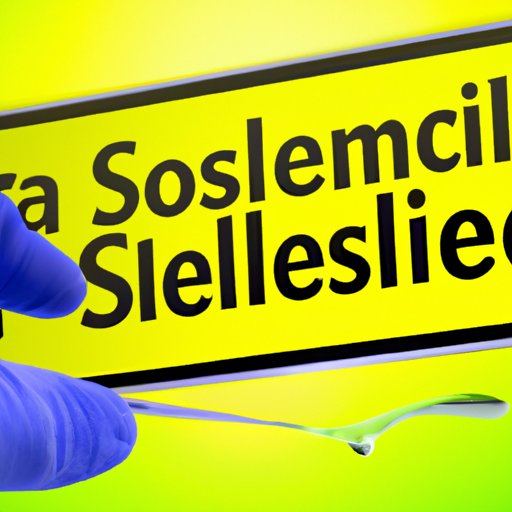
I. Introduction
Salmonella poisoning is a common bacterial infection that can lead to fever, diarrhea, and vomiting, and in severe cases, hospitalization and even death. It is caused by consuming contaminated food or water, and it can be challenging to detect in its early stages. In this article, we will provide a comprehensive guide to understanding the symptoms of Salmonella poisoning, how to tell if you have it, and what to do if you suspect you have contracted the illness.
II. A comprehensive guide to the symptoms of Salmonella poisoning
Salmonella is a bacteria that can cause illness in humans. It is usually spread through contaminated food or water, or by coming into direct contact with animals or their feces. Symptoms of Salmonella poisoning usually appear within 12 to 72 hours after exposure and can include:
- Fever
- Diarrhea
- Vomiting
- Abdominal cramps
- Dehydration
The severity, duration, and onset of these symptoms can vary depending on the person’s age, health status, and the source of contamination. Symptoms can last from a few days to up to a week, and some people may experience chronic diarrhea or other long-term complications.
III. How to tell if you’ve been infected with Salmonella
The first step in detecting Salmonella poisoning is to keep a close eye on your food intake and potential sources of contamination. If you have recently consumed contaminated food or water, you may start to experience symptoms such as diarrhea, abdominal cramps, and fever. To track your symptoms, it is essential to keep a record of when and where these symptoms appear and the severity of each.
If you suspect you have contracted Salmonella poisoning, the first thing you should do is try to stay hydrated by drinking plenty of fluids. You may also need to rest and avoid solid foods until your symptoms subside. It is also essential to seek medical attention as some cases may require antibiotics or hospitalization.
IV. Explaining the symptoms of Salmonella poisoning
Salmonella is a serious public health issue since it can cause long-term complications such as reactive arthritis, irritable bowel syndrome, and other chronic health problems. In severe cases, it can lead to hospitalization and even death.
Some less common symptoms of Salmonella poisoning include headache, muscle pain, chills, and bloody stools. In some cases, people may not experience any symptoms at all, making it challenging to detect and contain the illness. If you suspect you have been infected, you should seek medical attention immediately.
Salmonella poisoning is usually diagnosed by testing a stool sample. Antibiotics are usually prescribed for more severe cases, while mild cases can be treated with fluids and rest.
V. When to see a doctor if you suspect Salmonella poisoning
If you experience prolonged diarrhea, high fever, dehydration, or the appearance of blood in stool, it is essential to seek medical attention immediately. In severe cases, you may require hospitalization, intravenous fluids, and antibiotics. Your doctor may also recommend testing for other complications, such as dehydration or kidney failure. In some cases, Salmonella poisoning can lead to long-term health effects, such as reactive arthritis or irritable bowel syndrome, so it is crucial to seek medical attention right away.
VI. The sneaky symptoms of Salmonella poisoning
One of the challenges of detecting and preventing Salmonella poisoning is that symptoms may not always appear right away. Some people may not experience any symptoms, while others may only experience mild or flu-like symptoms. In addition, symptoms can vary depending on age, health status, and the source of contamination.
To minimize the risk of Salmonella poisoning, it is essential to take precautions such as washing hands thoroughly, cooking food to the appropriate temperature, and avoiding cross-contamination between raw and cooked foods. If you suspect that a particular food item may be contaminated, it is crucial to discard it properly and avoid consuming it.
VII. Conclusion
Salmonella poisoning is a serious public health issue that can cause severe illness, hospitalization, and long-term complications. Early detection, proper treatment, and prevention are critical in stopping its spread. If you suspect you have contracted Salmonella poisoning, it is essential to seek medical attention right away and take steps to minimize further exposure and illness.





